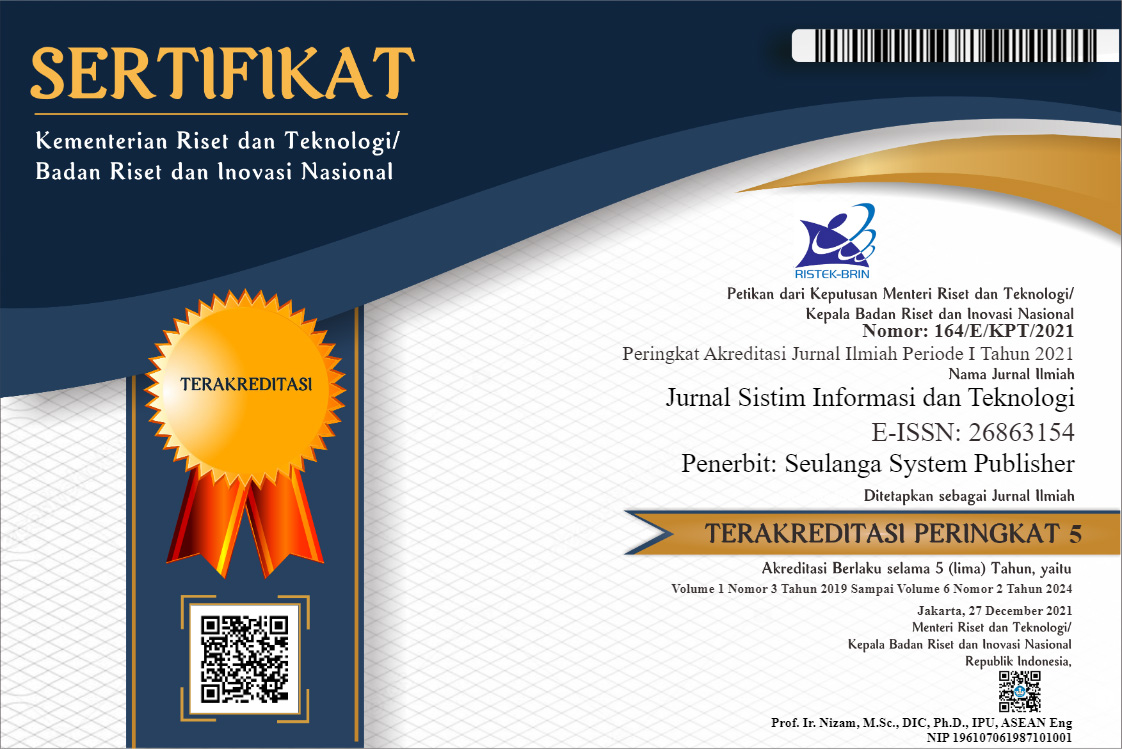Klasifikasi Tingkat Kepuasan Pengguna dengan Menggunakan Metode K-Nearest Neighbors (KNN)
DOI:
https://doi.org/10.37034/jsisfotek.v4i1.114Keywords:
K-Nearest Neighbor, Trans Metro Pekanbaru, K-Fold Validation, Data Mining, ClassificationAbstract
Pekanbaru is one of the largest cities in Riau Province which is known as a civil city. Pekanbaru is also a city with a fairly high density of vehicles and causes a higher level of congestion. A sustainable transportation system can be a solution to current transportation problems and public transportation itself plays a role in providing effective and efficient transportation facilities for the community. The purpose of classifying the level of satisfaction of Trans Metro Pekanbaru bus users is to obtain knowledge and rules for the satisfaction level of Trans Metro Pekanbaru bus passenger services. The data processed in this study were 170 datasets sourced from questionnaires given to Trans Metro Pekanbaru bus passengers. Based on the data collection, what is done first is to find the optimal k value using the k-Fold Cross Validation method, while to find the classification of the level of service satisfaction of bus users using the K-Nearest Neighbor method. The results of the classification of the level of satisfaction of bus users using the k-nearest neighbor method are as many as 0 people who are very satisfied, 5 people are satisfied and 0 people are not satisfied with the services provided. Meanwhile, the accuracy level generated based on the test results has an accuracy rate of 94.12% with the optimal k value is k = 5. The results of this classification can be used as a reference for Trans Metro Pekanbaru buses for policies in Pekanbaru Trans Metro bus services.
References
Febtriko, A., & Yulianti, W. (2019). Application Of The Concept And Monitoring Of Robot Line Follwer As a Prototype Of Pekanbaru Trans Metro Bus Towards The Revolution Industry 4.0 (Penerapan Konsep & Monitoring Robot Line Follwer Sebagai Prototipe Bus Trans Metro Pekanbaru Menuju Era Revo. Jurnal KomtekInfo, 6(2), 117–126. http://dx.doi.org/10.35134/komtekinfo.v6i2.50.
Siahaan, S. (2018). Faktor yang Berpengaruh terhadap Pemanfaatan Fasilitas Pelayanan Kesehatan Swasta. Jurnal Penelitian & Pengembangan Pelayanan Kesehatan, 87–94.
https://doi.org/10.22435/jpppk.v2i2.183
Ilyas, R. (2017). Time Value of Money dalam Perspektif Hukum Islam. AL-’ADALAH, 14(1), 157. http://dx.doi.org/10.24042/adalah.v14i1.1991.
Putri, M. N. (2017). Analisis Kualitas Pelayanan & Pengendalian Kualitas Jasa Berdasarkan Persepsi Pengunjung (Studi Kasus: Kualitas Pelayanan Di Kantor Pos Pa&g). Jurnal Matematika UNAND, 6(2), 70.
http://dx.doi.org/10.25077/jmu.6.2.70-77.2017.
Piri, H. G. (2013). Kualitas pelayanan jasa pengaruhnya terhadap loyalitas pelanggan pada Steiner Salon Manado. Jurnal EMBA: Jurnal Riset Ekonomi, Manajemen, Bisnis dan Akuntansi, 1(4). http://dx.doi.org/10.35794/emba.1.4.2013.2724
Ichsan, R. N., & Karim, A. (2021). Kualitas Pelayanan Terhadap Kepuasan Nasabah Pt. Jasa Raharja Medan. Jurnal Penelitian Pendidikan Sosial Humaniora, 6(1), 54-57. https://doi.org/10.32696/jp2sh.v6i1.729
Aziah, A., & Rabia, P. (2018). Analisis Perkembangan Industri Transportasi Online di Era Inovasi Disruptif (Studi Kasus PT Gojek Indonesia). Cakrawala, 18 (2), 149–156.
https://doi.org/10.31294/jc.v18i2.4117
Fakhriyah, P. (2020). Pengaruh layanan transportasi online (Gojek) terhadap perluasan lapangan kerja bagi masyarakat di Kota Cimahi. Comm-Edu (Community Education Journal). http://dx.doi.org/10.22460/comm-edu.v3i1.3719
Purbohastuti, A. W. (2018). Faktor Penyebab Beralihnya Konsumen Ojek Pangkalan Menjadi Ojek Online. Tirtayasa Ekonomika, 13(2), 238 https://dx.doi.org/10.35448/jte.v13i2.4306.
Fansyuri, M. (2020). Analisa Algoritma Klasifikasi K-Nearest Neighbor Dalam Menentukan Nilai Akurasi Terhadap Kepuasan Pelanggan (Study Kasus Pt. Trigatra Komunikatama). Jurnal Ilmiah Humanika, 3(1), 29-33.: https://dx.doi.org/10.36085/jsai.v3i453.5433.









